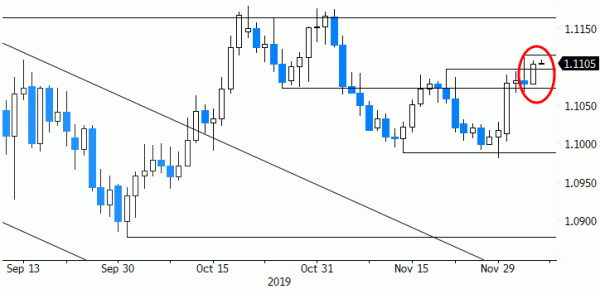- Rates: Disappointing payrolls would put us back to square one
US payrolls end a busy eco data week. Risks are tilted to the downside of expectations, which should benefit core bonds. In that case, the US Note future could return to this week’s opening levels following a volatile week driven by trade rhetoric and eco data. From a technical point of view, 1.7% is short term support within the reigning trading band. - Currencies: Will soft payrolls propel EUR/USD beyond 1.11 resistance area?
This week, the dollar ceded ground after mixed US eco data. Expectations for today’s payrolls are quite high. An miss might extend the USD correction, pushing EUR/USD beyond the 1.11 resistance. Sterling anticipates a conservative majority and clarity on Brexit. This remains the favoured scenario, but after recent rally adverse news might cause some nervous swings
The Sunrise Headlines
- US equities closed a choppy session barely changed yesterday with gains for the major indices ranging from 0.05% to 0.15%. Most Asian markets trade in the green this morning. South-Korea outperforms (+1.5%).
- The SPD’s new leadership is calling for a ‘massive’ investment programme in Germany but, unlike earlier, refrained from threatening to pull out of the coalition with Merkel’s CDU if the proposals are not accepted.
- The US opposed a multibillion World Bank loan for China, aimed to help fund green investments, market reforms and healthcare initiatives. The programme became ever more controversial in the US in the midst of a trade war.
- OPEC members agreed in principle they will deepen production cuts by 500 000 barrels a day. Brent oil prices decline to $63.2/b. as the increased output curbs are largely a formalisation of what already happened in practice.
- New Zealand’s central bank Deputy Governor Bascand doesn’t expect the banks raising their capital buffers to have a material impact on the economy, which he sees at a ‘turning point’ of entering a recovery. The Kiwi dollar rose.
- More than 800 000 workers across France demonstrated yesterday, protesting against Macron’s plans to harmonize the pension system. French labor unions announced they will extend their strike until Monday.
- Today’s economic calendar contains US November payrolls and the University of Michigan consumer confidence. Germany’s SPD decides over the fate of the Grand Coalition. UK’s Johnson and Corbyn debate ahead of the Dec 12 elections
Currencies: Will Soft Payrolls Propel EUR/USD Beyond 1.11 Resistance Area?
Will payrolls propel EUR/USD break beyond 1.11?
Yesterday was an ‘interim’ day for global (FX) trading. A first batch of US data earlier this week guided the dollar lower. The news on trade stayed diffuse. Contrary to last week, the dollar now was the weakest link in the chain of the major currencies. Strong (low level) US jobless claims were unable to change fortunes for the dollar. The trade-weighted USD (DXY) trended lower in the 97 figure. EUR/USD drifted higher to the 1.11 level, despite mediocre German order data (close 1.1104). USD/JPY reversed an intraday rebound as sentiment on risk dwindled (close 108.76).
This morning, Asian equities mostly show modest gains after uninspiring price action on WS. Uncertainty on trade persists, but headlines suggest China might prepare purchases of US agricultural goods. OPEC+ is expected to prolong production cuts, but the details still have to be agreed and compliance remains an issue. Brent oil is holding near $63 p/b. Major USD cross rates are little changed, mostly holding near recent lows. EUR/USD hovers near 1.11. The kiwi dollar extends gains on upbeat RBNZ comments on growth (NZD/USD 0.6555 area).
Today, headlines on trade still can affect global trading. In past, the dollar often profited from higher yields, e.g. on positive trade headlines, but we have the impression that this link is becoming loser. Regarding, the US payrolls, consensus expects a solid 183 000 job growth. The bar is high. In case of an undershoot, the dollar might be vulnerable.
Early this week, EUR/USD rebounded on divergent US-EMU eco news, including a soft US manufacturing ISM, bouncing off the 1.0980/1.10 support. The 1.11 resistance area was tested, but no sustained break occurred. The EUR/USD momentum improved. Today’s payrolls have the potential to trigger a break above 1.11. It would call off the downward alert and open the way for a retest of the 1.1179 top.
Sterling kept a solid bid yesterday. Investors apparently still reduced sterling short exposure ahead an expected Conservative majority at next week’s Parliamentary election. This remains the mostly likely scenario. Evidently, after recent sterling rally, any last-minute news questioning the expected outcome could cause nervous swings in the UK currency. The technical picture of sterling against euro and the dollar has improved after recent technical breaks (EUR/GBP below 0.8475).
EUR/USD tests in 1.11 resistance area. Payrolls to decide on a break.

